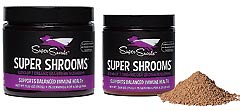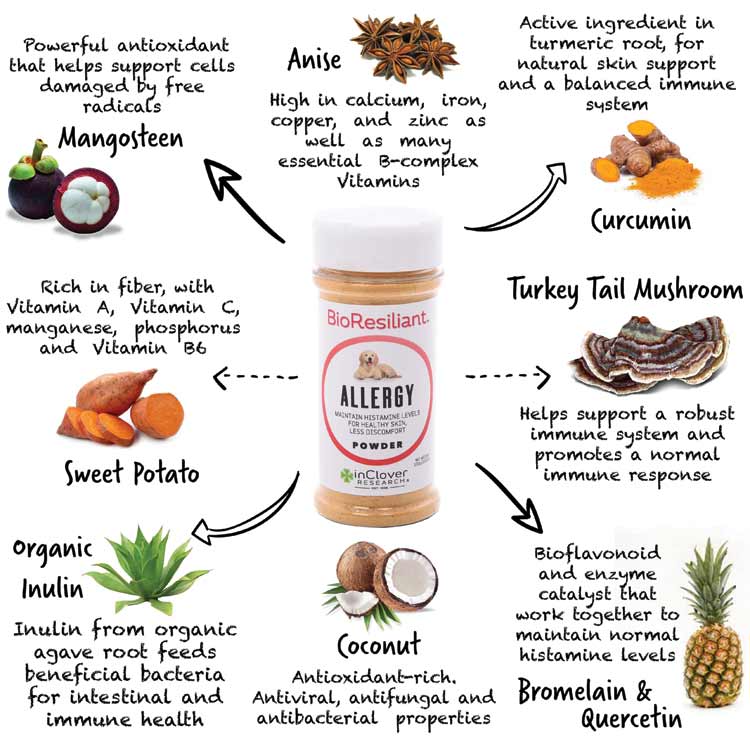The arrival of spring brings warmer weather, greener grass, and longer days to get outside and enjoy them. With the arrival of spring comes an allergy called hay fever triggered by the pollen that blankets the great outdoors. No matter where you live, an urban metropolis or the rural countryside, pollen can make life miserable. Symptoms of seasonal allergies in humans include runny nose, itchy skin and throat, and itchy runny eyes. But did you know that dogs and cats are also susceptible, though their symptoms are different?
Animals can’t tell us they’re suffering, so we must learn to recognize their allergy symptoms. Excessive head-shaking, scratching and biting at their skin, irritated & inflamed skin, inflamed and itchy ears and paws are all signs of allergic responses in your dog or cat. Seek the help of a veterinarian before these symptoms develop into life-threatening infection. In people, hay fever manifests in respiratory symptoms, but pets experience pollen allergy through disease of the body’s largest organ: the skin. Skin problems caused by allergies are a serious medical issue that can drastically diminish a pet’s quality of life.
So What Can You Do to Reduce Your Pet’s Exposure to Pollens?
Pet parents can take simple steps to prevent allergies from progressing to the point where they require prescription meds and a customized vaccine. The first and easiest anti-allergy strategy is a diligent daily wipe-down. Apply a clean, damp towel to dogs and cats after they spend time outdoors to remove pollen; do this every time they come inside. Yes, it’s a chore; to make it easier, prepare stacks of towels and a jug of water right by the entrance door to your home, so there’s no tracking of allergens throughout the house.
Focus especially on pets’ paws and paw-pads, taking care to wipe between the toes, where pollens accumulate and cause enormous irritation. Cats don’t love baths, but they do enjoy a thorough, full-body wipe-down, it’s how the mother cat grooms her kittens, and it’s a great opportunity to bond with your cat. As for dogs, if your dog loves to go swimming, now is the time to indulge and always follow up with a thorough toweling-off to remove pollen residue, making sure to gently wipe inside ears to prevent ear infection.
 Decrease pollen in the home by removing shoes and outerwear when you enter your home so pollens aren’t tracked into the indoor environment you share with your pet. Grass cutting exacerbates pollen allergies, so when it’s time to mow the lawn, be sure all windows and doors are closed, and if possible, ask your neighbors to tell you their landscaping schedule so you can be prepared to batten the hatches before you hear the rev of the lawn mower engine. Decrease pollen in the home by removing shoes and outerwear when you enter your home so pollens aren’t tracked into the indoor environment you share with your pet. Grass cutting exacerbates pollen allergies, so when it’s time to mow the lawn, be sure all windows and doors are closed, and if possible, ask your neighbors to tell you their landscaping schedule so you can be prepared to batten the hatches before you hear the rev of the lawn mower engine.
Launder pets’ bedding at least once a week. To simplify this chore, cover dog or cat beds with a sheet, so it’s easy to toss the used sheet into the wash while you re-cover the pet bed with a clean sheet. At bath time, remember that pets’ ears become irritated and itchy as a result of the allergic response. Talk to your veterinarian about the best ear cleanser to use if your pet’s ears are infected. If your dog or cat presents with red, puffy eyes, or excessive ocular discharge, gently wipe eyes using a cotton ball soaked in saline solution.
Foods & Supplements for Allergies
Allergies are an immune system response, so foods and supplements that fortify the immune system are crucial. A daily dose of omega-3 marine based oil like Icelandic plus Anchovy & Sardine Oil or Plato Wild Salmon Oil is recommended for pets for both immunity and skin health. Dogs and cats, even finicky ones, love the flavor, so giving this remedy is as easy as distributing tasty treats, just be sure to follow the dosage directions on the package.
Immune booster supplements like Super Shrooms, a powdered supplement of medicinal mushrooms promote healthy immune and cell function. They are natural “immune-modulators”, which means that they are able to go in to the body and adjust the immune system either up or down depending on the condition. They also support a healthy inflammatory response and detoxification process in the body.
BioResiliant from In Clover Research is made of active ingredients that tackle discomfort related to seasonal allergies. BioResiliant maintains normal histamine levels. Mangosteen addresses allergies while supporting intestinal health. Curcumin is a strong antioxidant found in turmeric and quercetin stabilizes the cells and releases histamine in order to maintain proper levels within a dog’s system. Turkey tail is a strong antioxidant that aids the immune response and organic inulin is a prebiotic that provides immune support.
Finally, an anti-inflammatory diet is the way to go. That means more fresh food and less processed food whenever possible, including raw meat, raw bones, fresh vegetables, goat milk as well as bone broth. If you can’t be your pets’ personal chef, select a healthy brand of quality commercial food and supplement with fresh foods like whole raw eggs, fish oils and high protein toppers. There’s no better way to tell adored dogs and cats “I love you” than with a delicious bowl of allergy-fighting food.

|

 Decrease pollen in the home by removing shoes and outerwear when you enter your home so pollens aren’t tracked into the indoor environment you share with your pet. Grass cutting exacerbates pollen allergies, so when it’s time to mow the lawn, be sure all windows and doors are closed, and if possible, ask your neighbors to tell you their landscaping schedule so you can be prepared to batten the hatches before you hear the rev of the lawn mower engine.
Decrease pollen in the home by removing shoes and outerwear when you enter your home so pollens aren’t tracked into the indoor environment you share with your pet. Grass cutting exacerbates pollen allergies, so when it’s time to mow the lawn, be sure all windows and doors are closed, and if possible, ask your neighbors to tell you their landscaping schedule so you can be prepared to batten the hatches before you hear the rev of the lawn mower engine.
